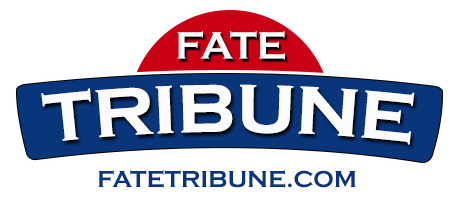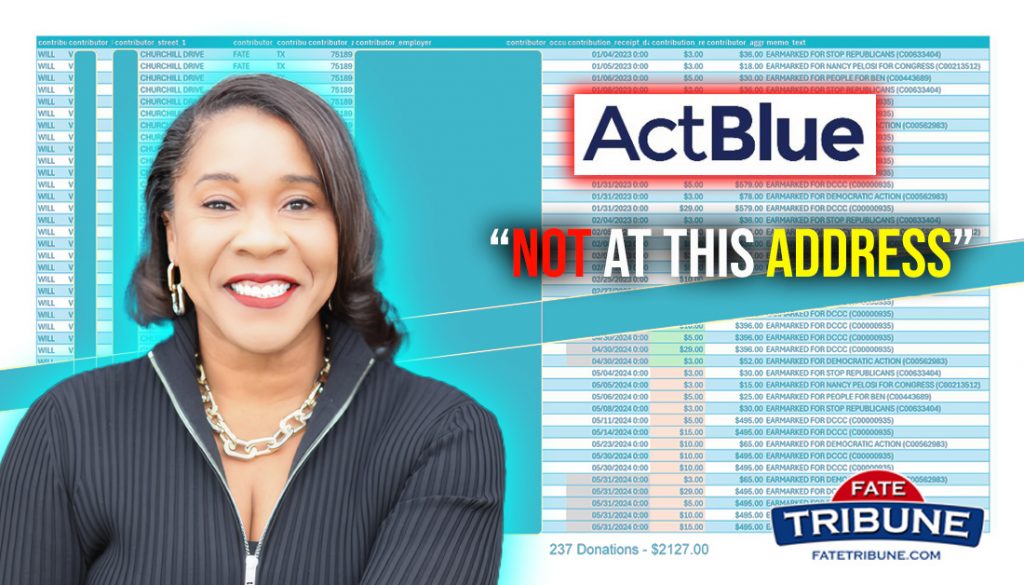Fate, Texas—In a town where the population hovers just above 18,000, the idea of shadowy, large-scale political fundraising schemes seems far-fetched. Yet, recent revelations have brought the controversy surrounding ActBlue, a major fundraising platform for Democratic candidates, right to our doorstep. A deep dive into the Federal Election Commission (FEC) records, coupled with ground-level investigations, has uncovered a disturbing pattern of political donations tied to individuals no longer residing at the reported addresses or in some cases, donations so minuscule and frequent that they raise more questions than they answer.
A Surge in Small Donations: A National Issue Hits Home
The story of ActBlue’s allegedly fraudulent donation practices first gained national attention when investigative reporter James O’Keefe confronted individuals listed as frequent donors. What he found was alarming—elderly citizens who barely remembered donating were purportedly giving thousands of dollars through ActBlue, often multiple times a day. The implications were clear: either these individuals were being exploited, or their identities were being used without their consent. Senator Marco Rubio even demanded a Federal Election Commission (FEC) investigation into what he described as “alarming reports of fraudulent donations.”
Here in Fate, our own investigation into ActBlue and related Democratic fundraising platforms has revealed a series of irregularities that echo these national concerns. We’ve identified several individuals whose reported donations raise significant questions.
The Case of Will: A Generous Ghost Donor?
Will V., who previously lived on Churchill Drive in Fate, TX, appears to be one of the most prolific donors to the Democratic Congressional Campaign Committee (DCCC) through ActBlue. According to FEC records, Will, or someone using his name, made 237 donations totaling $2,127.00 over 17 months, for an average of 14 donations per month. There were days when he reportedly made three, four, or even five donations. However, when we visited the address tied to these donations, we discovered that Will hadn’t lived there for over two years. The current resident speculated that he may have moved to Arizona, but we could not confirm his whereabouts or reach him for comment.
The question arises—if Will has not been living at the listed address, who is behind these donations? Is someone using his identity, or is this a case of fraudulent reporting by the platform? The situation mirrors similar concerns raised by the national ActBlue investigation, where individuals were shocked to find themselves listed as frequent donors.
Sandra: A Pattern of Small, Frequent Donations
Another curious case involves Sandra D. of Butternut Drive. Over 16 months, Sandra made 40 donations totaling $366.00. Most of her contributions were $5.00, with a few at $10, $15, and $20. Interestingly, all her donations since May 2023 were earmarked specifically for the DCCC.
Yet, like Will, Sandra no longer resides at the address tied to her donations. The current resident was less than forthcoming, only mentioning that Sandra had moved “recently.” However, the pattern of small, frequent donations, especially from someone no longer residing at the listed address, raises red flags. Is Sandra aware of these donations, or is someone else using her name?
Diane: Pennies Add Up in Political Fundraising
Diane J., who lived on Hankinson Lane, presents another perplexing case. Over 17 months, Diane made 59 donations totaling $178.71. Her donations often came in amounts as small as $0.40, $0.57, and $1.00. All donations under $1.00 were directed to ActBlue.
Upon visiting the address associated with Diane, we learned that she hadn’t lived there in several years. The current resident reported that Diane rented the property out before eventually selling it due to issues with tenants. Once again, the question arises—who is making these donations, and why in such small amounts?
How a Donation Ledger Should Look
Of the half-dozen of door knocks we made, only one turned out to have a resident that was living at the address, and who confirmed the donations listed in the register. Cathy Z. of Landon Trail, made 41 donations totaling $394.00. Unlike the others, Cathy confirmed that she made these donations, mostly in amounts of $5.00, $10.00, $15.00, or $20.00. What is different about the accounting for her donations is that ALL of her donations were earmarked for specific candidates rather than reserved for the DCCC or ActBlue. Furthermore, unlike the others, there were no ‘odd’ fractions or dollar amounts. In short, her ledger looks clean and represents a normal, human pattern.
The National Context: ActBlue Under Scrutiny
The issues we’ve uncovered in Fate are a microcosm of the broader concerns surrounding ActBlue. Nationally, Republican lawmakers have raised alarms about potentially fraudulent donations and deceptive fundraising practices. Representative Claudia Tenney, R-N.Y., recently called on the FEC to investigate ActBlue’s practices, citing “fraudulent, deceptive, and potentially illegal behavior.” These allegations have prompted Texas Attorney General Ken Paxton to launch his own investigation into ActBlue.
Paxton’s investigation has already yielded some results. Because of the investigation, ActBlue now requires CVV codes for donations, a change that Paxton hailed as a critical measure to prevent fraudulent contributions. The CVV code (that 3 digit number on the back of your credit card) is what attaches that card to the specific person named on the card. However, it’s not clear whether this will solve the problem of donations made in the name of another person, as the payment for the donation is a separate system from that of the donations. A CVV only ensures that the person making the payment is the same person who’s name appears on the card. But it could provide a mechanism for law enforcement to match up payments with donations, something that is currently impossible.
The Local Impact: Are Fate Residents Being Exploited?
For a small town like Fate, the idea that residents’ identities could be used in a nationwide political fundraising scheme is troubling. The cases of Will, Sandra, Diane, and others raise serious questions about how ActBlue and similar platforms operate. Are these platforms exploiting unsuspecting individuals, particularly the elderly, or is there something more sinister at play?
The national investigations into ActBlue are ongoing, and it’s unclear what the final outcome will be. However, what is clear is that small towns like Fate are not immune to the tactics and controversies that plague national politics. The residents of Fate deserve answers, and it’s incumbent upon both local and national authorities to get to the bottom of these suspicious donations.
Protect Yourself
Fate residents should be vigilant and protect themselves. You should check the FEC database to see if someone is making donations in your name. If you find your name listed as a donor without your knowledge or if you suspect fraudulent activity, it’s crucial to report it immediately. The integrity of our political system depends on the transparency and accountability of those who operate within it.
For now, the questions raised by these cases are anything but small. In a world where political influence often seems to be dictated by those with the deepest pockets, the integrity of the individual voter—no matter how small their donation—must be protected.
The Fate Tribune will continue to monitor this developing story and report on any new findings. As always, we encourage our readers to reach out with any information or concerns they may have regarding this or other issues affecting our community.
Note: All the names and addresses mentioned in this article have been cross-referenced with FEC records. Even though names, addresses, and donations are public records, we have elected to redact the full last name of Fate residents and include only the minimum information necessary to provide a complete report.

